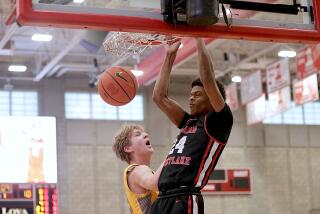He Wouldn’t Think of Himself, So They Did
- Share via
Easy decisions are sometimes hard to make.
Tell a man his prostate cancer is spreading and, after the jolt wears down, he’ll likely tell the doctor to attack the disease with whatever means.
The survival instincts take over; everything else becomes secondary.
Work matters, but less than before. The desire for material things dwindles. There’s an urgency to spend more time with family and friends.
As the saying goes, it puts things in perspective.
Nobody had to tell that to Carl Ferrill, football coach at Valley College.
Ferrill, 53, learned late last year he had prostate cancer. The news rattled him, but he chose to postpone treatment until after the season. He would then lick this cancer like the one that invaded his colon a few years before.
Things didn’t go as planned. Radiation didn’t kill the cancer and Ferrill needed surgery. But Ferrill took a different approach. He tried to put off the operation until after this season and kept working through the nausea, the vomiting and the lack of energy produced by the treatments.
“The guy was incredibly sick,” said Chuck Ferrero, Valley’s athletic director.
It got worse. Ferrill was rammed by players during a game while standing on the sideline, tearing ligaments in one knee. And a few days ago, perhaps partly because of the cast on the leg, Ferrill fell and cracked his skull.
“The whole thing just snowballed,” said Ron Ponciano, the assistant head coach now running the team.
Until the school could no longer stand by passively. Last week, Ferrill was placed on medical leave. He needed to look after his health, not football players.
The process started Wednesday, when Ferrill had knee surgery, and continues next month with cancer surgery.
“What options did we have?” Ferrero said. “You had to play it out until he couldn’t do it anymore and was putting himself in jeopardy.”
Those who know Ferrill, who watched the man agonize over self or duty the last few months, refuse to comment about his decision to delay treatment. It was a personal issue, they say, a decision only Ferrill could make. He knew the risks and the potentially grim outcome.
They are right. No one should presume to know what’s best for someone else, unless it’s parents acting on behalf of their children. No one knows why people make certain choices, as unreasonable and peculiar as they might seem sometimes.
But in Ferrill’s case, his refusal to turn over the ship to Ponciano or anyone else a lot sooner disrupted the Monarchs to perhaps the point of no return.
The Monarchs are 1-4, 1-2 in Western State Conference Northern Division play, and faced with a bumpy road. Their defense is holding up as well as can be expected, considering it spends so much time on the field.
Of Valley’s 60 first downs, which rank 14th in the 16-team WSC, 12 came by penalties. That’s a lot of one-two-three-punt. Or one-two-fumble. Or one-two-interception.
Ferrill oversaw the offense, even though Marc Dumlao is the offensive coordinator. When Ferrill became ill, finally to the point of missing practice, the Monarchs were virtually two entities within one. The defense leaped ahead while the offense sputtered.
It’s anybody’s guess whether the offense would have developed quicker had Ferrill stepped aside earlier. The Monarchs have decent personnel, capable of generating more firepower and better results. They needed more preparation, more structure.
In fairness to Ferrill, he tried his best. But he was in a quagmire, torn between staying with the team as long as possible or tending to his body, which desperately needed care.
And there was the psychological aspect, too. By being around the players and assistants, Ferrill could devote his attention to football matters, not personal problems. He could draw some inner peace from an environment that has given him great pleasure for many years.
When the school forced his hand last week, Ferrill left grudgingly.
“He kept saying, ‘Coach, I didn’t quit on this team,’ ” said Ponciano, who was fired as coach at Cal State Northridge after the 1998 season. “I said, ‘Nobody says you did, Carl.’. . . I know the devastation and depression one feels when one doesn’t have a team. I feel for him.”
Perhaps Ferrill can draw from his fighting spirit to pull through this crisis. In his biographical sketch in the Valley media guide, Ferrill offered a glimpse into his childhood, admitting he wasn’t a good student.
“We moved around a lot,” Ferrill said. “Not to mention we didn’t have enough money. My mother made my clothes, gave me haircuts and did whatever was necessary to contribute to our family life. It’s hard to focus on reading, writing and arithmetic when survival is a primary concern.”
Ferrill’s survival concerns have come full circle. May everything work out for him as well as they have until now.
More to Read
Go beyond the scoreboard
Get the latest on L.A.'s teams in the daily Sports Report newsletter.
You may occasionally receive promotional content from the Los Angeles Times.










